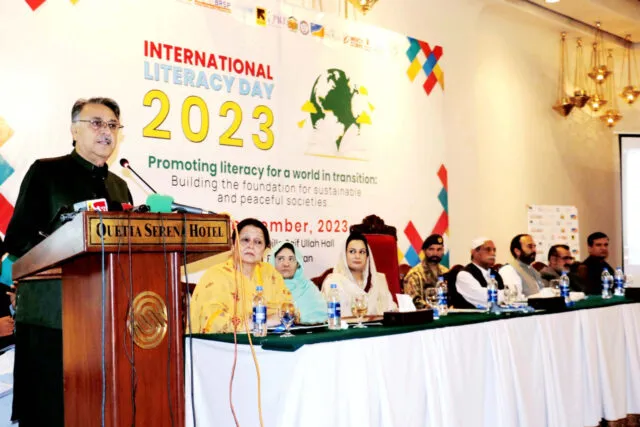Bisp Ban Balochistan Governor Advocates for Prioritizing Education and Employment
Is BISP a Welfare program ? In a thought-provoking address at a seminar commemorating International Literacy Day, Balochistan Governor, Malik Abdul Wali Khan Kakar, voiced his concerns about the government’s substantial allocation of funds to the Benazir Income Support Programme (BISP) welfare. His impassioned argument centered around the belief that BISP funds could be more effectively utilized to fortify the education sector and upgrade industries that create employment opportunities within Pakistan.
The Power of Education in National Development
Governor Kakar’s speech underscored the pivotal role that education plays in the development of a nation. He passionately called upon the government to redirect its focus, channeling maximum resources and opportunities towards advancing education in Pakistan. His vision is one of a prosperous and developed Pakistan, standing proudly on the global stage.
Shifting Priorities: From Charity to Job Creation
Governor Kakar emphasized the urgency of redirecting funds away from perpetuating dependency on charity, as exemplified by the distribution of meager sums in welfare programs like BISP. Instead, he advocated for a shift in priorities towards the establishment of institutions geared towards generating employment opportunities. This change in focus, he argued, would not only empower the citizens but also contribute significantly to the growth and prosperity of the nation.
The Role of BISP Welfare and Education in National Development.
The decision on whether the government should spend more on education or welfare programs is a complex one and often depends on the specific needs and circumstances of a country. It’s important to strike a balance between these two priorities. Here are some considerations:
- Investing in Education:
- Education is often seen as an investment in the future of a nation. A well-educated population can drive economic growth, innovation, and social progress.
- Improving educational infrastructure, quality, and accessibility can lead to a more skilled and competitive workforce.
- Education can help reduce poverty and inequality by providing individuals with the skills they need to secure better job opportunities.
- Welfare Programs:
- Welfare programs are essential for addressing immediate and pressing needs of vulnerable populations, such as the elderly, disabled, and those living in poverty.
- These programs like BISP provide a safety net and ensure that basic needs like food, housing, and healthcare are met, promoting social stability.
- Balancing Act:
- Ideally, governments should aim for a balanced approach, investing in both education and welfare programs.
- A well-educated population is more likely to become self-sufficient and rely less on welfare programs in the long run.
- Welfare programs are necessary to address immediate poverty and inequality issues.
- Prioritizing According to Needs:
- The allocation of funds should be based on the specific needs and conditions of a country. For example, a country with a high illiteracy rate may prioritize education, while a nation facing a significant poverty crisis might focus more on welfare programs.
- Efficiency and Accountability:
- Regardless of the choice, it’s crucial to ensure that funds are used efficiently and that welfare programs have mechanisms to prevent abuse and encourage recipients to become self-reliant.
Ultimately, the government should assess its current economic and social conditions, consult with experts, and involve citizens in the decision-making process to strike the right balance between investing in education and welfare programs. The goal should be to create a society where people have access to quality education and a safety net that prevents extreme poverty and ensures a decent standard of living for all.
